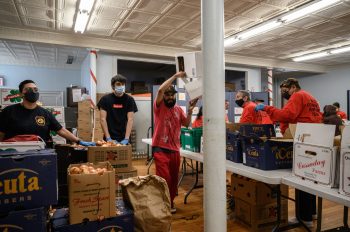Higher food prices won’t always hurt
TEXT OF COMMENTARY
Kai Ryssdal: The floods that’ve been hitting the Midwest this week are threatening to push already high food prices even higher. Today, the Department of Agriculture lowered its already-low guess for the size of this years corn crop by 3 percent.
Short supplies of some crops have contributed to food prices rising at twice the rate of inflation, which sounds bad, and in absolute terms it is, but commentator and economist Tyler Cowen says we’ll adapt.
Tyler Cowen: We all know that food prices are rising fast. As a result, people are cutting back on their food expenditures. They’re buying fewer luxuries and eating at home more often. That’s the shorter run trend. But here’s what’s less commonly understood: In the longer run, organic food, luxury foods and fancy restaurants will do just fine.
The economic logic is this: If all food becomes more expensive, what originally looked expensive suddenly appears cheap in relative terms. Consider a simple example: If food costs nothing to transport, say cheap milk would be $2 and organic milk would be $4. The organic milk costs twice as much. Now add on a $2 transport cost to each item. The price comparison is then $6 to $4. The organic milk seems only a little more expensive. If you are going to buy milk in any case, you might even switch to the organic product.
Of course at first, people are horrified by the higher prices. They cut back on food costs across the board, as we’ve been seeing. We’re also in the middle of a recession and that won’t last forever. Over time, people will get used to the general idea that food costs so much. They’ll start to think about spending more for the organic milk because, in relative terms, it doesn’t seem so outrageously high. Wealthier families in particular will turn away from Safeway and look toward Whole Foods.
Economists refer to this result as the “Alchian and Allen theorem,” named after its two founders Armen Alchian and William Allen, both formerly economists at UCLA. There’s a lot of evidence that the theorem describes actual consumer behavior; it also explains why people tend to spend more when they are on vacation — because it is not worth flying across the country to eat at McDonald’s.
So if food costs stay high, for a lot of people the future will be fresh pasta, caviar and organic tomatoes, not plain oatmeal and a can of beans.
Ryssdal: Tyler Cowen is a professor of economics at George Mason University. His latest book is called “Discover Your Inner Economist.”
There’s a lot happening in the world. Through it all, Marketplace is here for you.
You rely on Marketplace to break down the world’s events and tell you how it affects you in a fact-based, approachable way. We rely on your financial support to keep making that possible.
Your donation today powers the independent journalism that you rely on. For just $5/month, you can help sustain Marketplace so we can keep reporting on the things that matter to you.


















